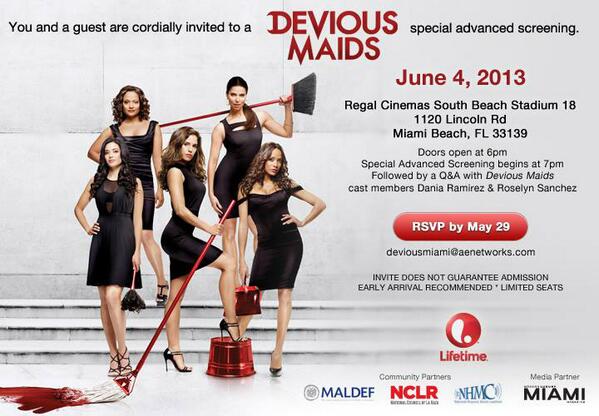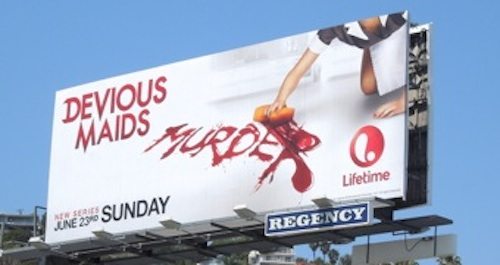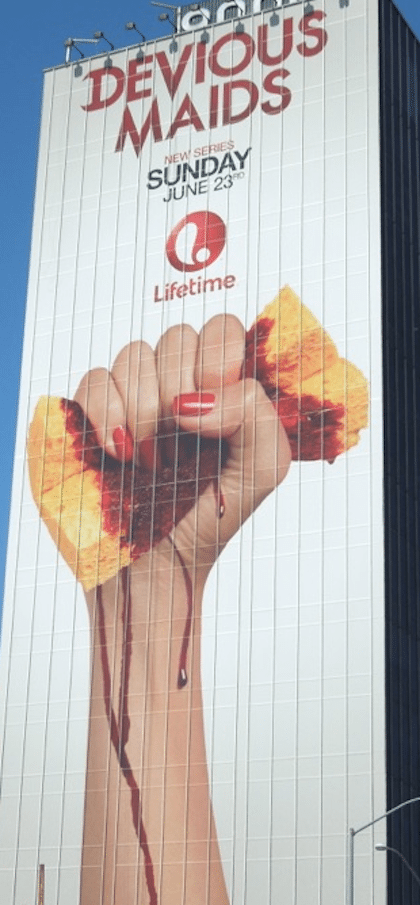So maybe Marc Cherry and Eva Longoria should be thankful for the Huffington Post piece that Tanisha Love Ramirez wrote on May 3, which led to Longoria’s response to Ramirez, which led to a piece by the editor-in-chief of Cosmopolitan for Latinas, which led to more posts about the show, especially one by Alisa Valdes-Rodriguez that went viral on NBC Latino. The online chatter will very likely lead many curious viewers to tune into tonight’s premiere on Lifetime.
The debate surrounding the show, which casts five Latina actors playing five Latina maids, has been active and healthy, for sure. From our own publisher questioning why Latino civil rights organizations promoted a show using a picture of five Latina maids in tight black dresses holding brooms and a mop dripping with blood , to Hollywood writers calling out our publisher for overreacting, to bloggers getting paid to do a “review” telling us that the show isn’t so bad and that we should all watch it.
Now, the mainstream press has entered the discussion. The results are mixed, and in the case of The New York Times’ Alessandra Stanley, quite bizzarre. Let’s start with Stanley and what she wrote. Granted, Stanley has an infamous history of factual errors and misreporting. For example, her gaffes about the death of Walter Cronkite in 2009 caused the Times to issue a very embarrassing public apology.
Guess The Times didn’t learn from Stanley’s journalistic transgressions of the past, since someone at the paper approved what Stanley wrote in the “Devious Maids” review:
There has been a small, but noisy, reflex reaction against “Devious Maids,” because it casts Hispanic actresses as cleaning ladies, which is missing the point.
Television has more Hispanic performers than ever before, and dramas and sitcoms have always offered plenty of working-class heroes, but the imperative to avoid offensive stereotypes is so strong in Hollywood that when it comes to regular characters, Hispanics are more often cast as homeowners than housekeepers. When he got his own show, George Lopez made a point of playing a manager at an aviation company; his father, long-lost, was a businessman; his father-in-law, a doctor.
We won’t even address Stanley’s belief of “a small, but noisy reflex,” but we do wonder what television world is Stanley referring to when she states that “television has more Hispanic performers than ever before?” Even Longoria would have to disagree with Stanley on that one. Last year, Longoria said this: “I think we still have a lot more work to do In the United States we’re 16% of the population, but we’re only maybe 10% represented in television and films, so we’re still under-represented.” Granted, Longoria also said then that “Devious Maids” should be a show that the Latino community must support, but let’s not pretend that television is all of a sudden Latino-friendly. It is not, and for Stanley to use George Lopez as her example is laughable. Lopez doesn’t even have a show on television right now. And “more often cast as homeowners than housekeepers?” Really? Where was Stanley going with this, and when will The Times issue another public apology for her errors?
The rest of Stanley’s review questions why television no longer writes roles for domestic workers. Echoing a time when domestic workers were central figures on shows, Stanley then writes, “That’s partly because domestic servants, who often live with the families they work for and develop an intimate, but unequal relationship with their employers, belie Americans’ egalitarian and anti-elitist self-image. In a culture that prides itself on upward mobility and class-blindness, maids and housekeepers are an unwelcome reminder of society’s more exploitative underbelly. It’s a particularly delicate issue because low-skill, low-wage jobs are more often filled by poor minorities and immigrants, documented and not.”
She then closes with this:
“Devious Maids” doesn’t try to correct the balance. This isn’t a show about how the other half really lives. It’s an over-the-top dramedy that was partly inspired by a Mexican telenovela, “Ellas Son … la Alegría del Hogar.” It champions the maid and mocks the rich and powerful: Susan Lucci of “All My Children” fame plays a wealthy, man-crazed matron.
All the maids are Latinas, from different backgrounds, and each has a secret agenda. Carmen (Roselyn Sánchez) takes a job as a maid in the household of a Latin pop music star to try to impress him with her music, and Marisol (Ms. Ortiz) pretends to be a maid to investigate a murder that the police — and the employers — have pinned on her son.
Marisol is the central heroine, but it’s a villainess who steals the most scenes. Rebecca Wisocky, who played Bree’s mother on “Desperate Housewives,” is the imperious and manipulative Evelyn Powell, a woman who weeps when her maid is killed not because of the loss but because of the blood on her living room carpet.
“My maid was murdered,” Evelyn wails indignantly at the police. “Who is going to clean all this up?”
“Devious Maids” is the one show on television that answers the question.
The elitist tone of Stanley’s review is part of the problem with how the mainstream is viewing the show, and we wonder if she or others would even want to address what the Tampa Bay Times’ Eric Deggans suggested last week: “Imagine a major TV outlet debuting a soap opera-style drama about five young, contemporary, beautiful African-American women. Who work as maids. Then try to imagine the NAACP, Urban League and Will Smith standing up to defend the program, saying it was an important look into the lives of black servants that would give great roles to black actresses.”
Another example is the USA Today review, which called the series “delicious summer TV.” The best part of that review (also mixed) was this: “And of course, there’s another obvious yet important difference. Cherry and Longoria have built this new show around Latina characters, and are using them to explore (sometimes comically, sometimes directly) the socioeconomic divide between rich homeowners and the women who, to paraphrase the nastiest and funniest of the employers, mop floors for people who don’t bother to learn their last names.”
The review closes with philosophical proposal:
None of us should want a TV universe where Latina women are only presented as maids — but these women do exist. Surely their stories should be allowed to be told, and Maids seems set to tell them fairly well, and in entertaining fashion.
Whatever the season, why complain about that?
Ahh, we don’t know, because there are no other shows in the TV universe that feature prominent Latina leads that would balance a primetime soap opera about five Latina maids? Does that work for you?
Then there is Variety, which writes: “Setting aside concerns about stereotypes and socioeconomics for a moment, it’s fascinating how much “Devious Maids” — from “Desperate Housewives” producer Marc Cherry and one of its stars, Eva Longoria — resembles their last collaboration, for mostly good and some ill.”
Ok, that is one big thing to overlook, but please, say more:
The program is adapted from a Spanish-language series, “Ellas son … la alegría del hogar,” and some of the cultural rifts between that show and the U.S. version are clearly apparent. For all the talk about the One Percent, Americans seldom consider or perceive the country’s caste system or class disparity in quite the same way it’s seen by many South-of-the-border neighbors.
There’s also no avoiding the wince-inducing aspects of sexy Latin maids, particularly with five glamorous actresses — plastered across billboards in slinky black dresses — cast in those roles. Although the series reserves its harshest views and most exaggerated portrayals for their Beverly Hills bosses, Hispanic groups grousing about the premise sight unseen aren’t completely off base in their criticisms.
Nevertheless, get past the title, and “Maids” plays like a conventional primetime soap. Moreover, the Latina-led cast and telenovela-like situations should significantly bolster the show’s commercial prospects by serving as a major attraction to the fast-growing (and younger-skewing) Hispanic audience, already well versed in the over-the-top qualities of serialized fare on Univision or Telemundo. Plans for a bilingual premiere only make the marketing strategy more explicit.
Right, because you know those U.S. Latinos. Just give us bilingual content, not matter how mediocre, and we will just jump at it. The mistake the mainstream media and Lifetime are making is that many of Longoria’s demographic (young, professional bilingual, bicultural Latina professionals) think the Univision and Telemundo soaps operas are crap, too. They don’t like in it Spanish and they won’t like it in English. Missed opportunity, indeed.
And yes, Variety has one issue with the show, and it’s this:
As for false notes, the show has done itself one disservice: By lensing in Georgia, it can replicate the opulent mansions of Beverly Hills, but not the exteriors, so most of the action is virtually housebound. It’s a small quibble, but one that felt noticeable in the two initial episodes, and might become more pronounced over time.
Still, for a new TV series, time — and the prospect of a long run — is a nice problem to contemplate. And if the first pass is any indication, it’s the one happy headache with which these not-so-merry “Maids” appear destined to grapple.
The privilege is dripping, we guess.
Slate seemed to summarize it best, when it said this:
Unfortunately, if any of those people check out the first episode on Lifetime this Sunday, they’ll discover a parade of utterly predictable stereotypes—of Latina maids who are both devious and pure of heart, and of their Caucasian employers, who are all selfish, utterly detestable, entitled snobs.
And this:
But a good TV drama about maids has, suffice it to say, yet to be made. And someone should make it! Class and race remain tragically underexplored topics on television. They deserve to be treated with a modicum of realism. For all its predictability, the worst sin of Devious Maids is that it repeatedly shows the maids sassing their employers, sharing leisurely lattes in fancy cafes, or gossiping around picnic tables. Just because they work in Beverly Hills doesn’t mean they can afford to socialize there, or that they would be made to feel welcome. The fact that Marc Cherry doesn’t seem to understand any of that is the most obvious indication that he has no idea what maids’ lives are like, devious or otherwise.
Say one thing about Longoria. She will defend her show to the very end: “When we get any sort of backlash, sort of ‘they are playing the stereotypical maids; my immediate response is that ‘so you’re telling me those stories aren’t worth telling?'” We respect that, and yes, those stories are worth telling, Eva, but not with a recycled telenovela from Mexico.
We are better than this. Mediocrity is not the goal here. The end goal is excellence. Sadly, “Devious Maids” is not excellence for the community. Let’s stop pretending that it is.





